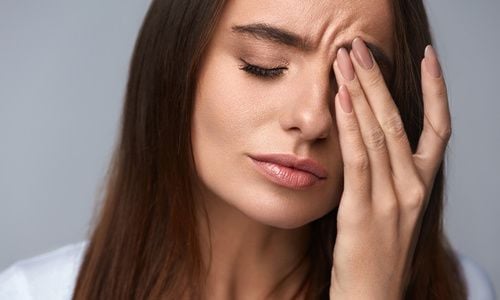
Bothered by Eyelid Spasms? Here's How You Can Stop the Twitching
Twitching eyelids are incredibly annoying, whether the problem only lasts an hour or continues for much longer. Determining the cause of your eyelid spasms can help you make a few changes that may prevent the twitching from happening again.
Strategies for Preventing Eyelid Spasms
Eyelid spasms aren't usually a cause for concern. They last just long enough to be a nuisance and then disappear for weeks or months. In some cases, twitching eyelids can be a sign of a neurological condition, according to the American Academy of Ophthalmology. If the spasms last longer than a week, affect your vision, cause drooping eyelids, or other muscles in your face begin to twitch, call your optometrist.
These tactics may help you stop and prevent spasms:
- Get More Sleep. Twitching is more likely to occur if you've been suffering from insomnia or recently pulled an all-nighter. Taking a nap, treating insomnia, or increasing the number of hours you sleep at night may end the spasms.
- Find a Stress Relief Outlet. Have you noticed that your spasms tend to appear when you feel particularly anxious or stressed? Twitches are a common effect of stress and tend to go away when you relax. When you're feeling stressed, exercise, meditate, practice yoga, read a book, watch a movie, talk to a friend, or do anything else you find calming.
- Keep Your Eyes Moist. Lack of moisture caused by aging, medication side effects, contact lens wear, and other factors can trigger eye spasms. If you suffer from dry eyes, use over-the-counter drops and wear wraparound sunglasses to prevent the wind from drying out your eyes when you venture out. If these measures don't help, talk to your eye doctor.
- Reduce Eyestrain. Eyestrain is an increasingly common problem, due in large part to our reliance on digital devices. The condition can cause your eyes to burn and feel sore or tired. Eyestrain may also be responsible for twitching eyelids, headaches, and dry eyes. Taking frequent breaks from digital devices, reading, or close work can help you avoid eyestrain and dry eye.
- Limit Alcohol and Caffeine. Overindulging in beverages that contain alcohol or caffeine may be the cause of your twitches. Reducing your intake of alcohol, coffee, tea, and caffeinated soft drinks may end your spasms.
- Treat Your Allergy Symptoms. Allergies not only cause sneezing, runny nose, and nasal congestion but can also make your eyes twitch, burn, tear, redden, or feel sore. Oral allergy medication may help as can allergy eye drops. Drops can reduce inflammation, redness, itching, and other symptoms. If over-the-counter drops aren't helpful, your optometrist may prescribe more effective prescription drops.
- Wear Sunglasses. Spending too much time in the sun without protection could also trigger the spasms. Wearing sunglasses every time you step outside may reduce the twitching and also protects your eyes from the harmful effects of ultraviolet A (UVA) and ultraviolet B (UVB) light. Long-term exposure to UVA and UVB can increase your risk of macular degeneration, cataracts, and cancer of the eye.
- Improve Your Diet. Eyelid spasms might occur if you don't receive enough magnesium or other nutrients. Magnesium helps your body regulate muscle and nerve function. If it's too low, twitching, muscle spasms, fatigue, nausea, numbness, and tingling can occur. Eating whole grains, dairy products, nuts, tofu, dark chocolate, spinach, and leafy greens, and bananas can help you increase your magnesium level naturally. If your symptoms continue, let your doctor know.
Are you concerned about your twitching eyes? Try to practice these helpful tips to stop the spasms.
Sources:
Cleveland Clinic: Feeling Fatigued? Could It Be a Magnesium Deficiency, 2/6/19
All About Vision: Eye Twitching: 8 Causes and Treatments
American Academy of Ophthalmology: How to Stop Eye Twitching, 7/27/17
